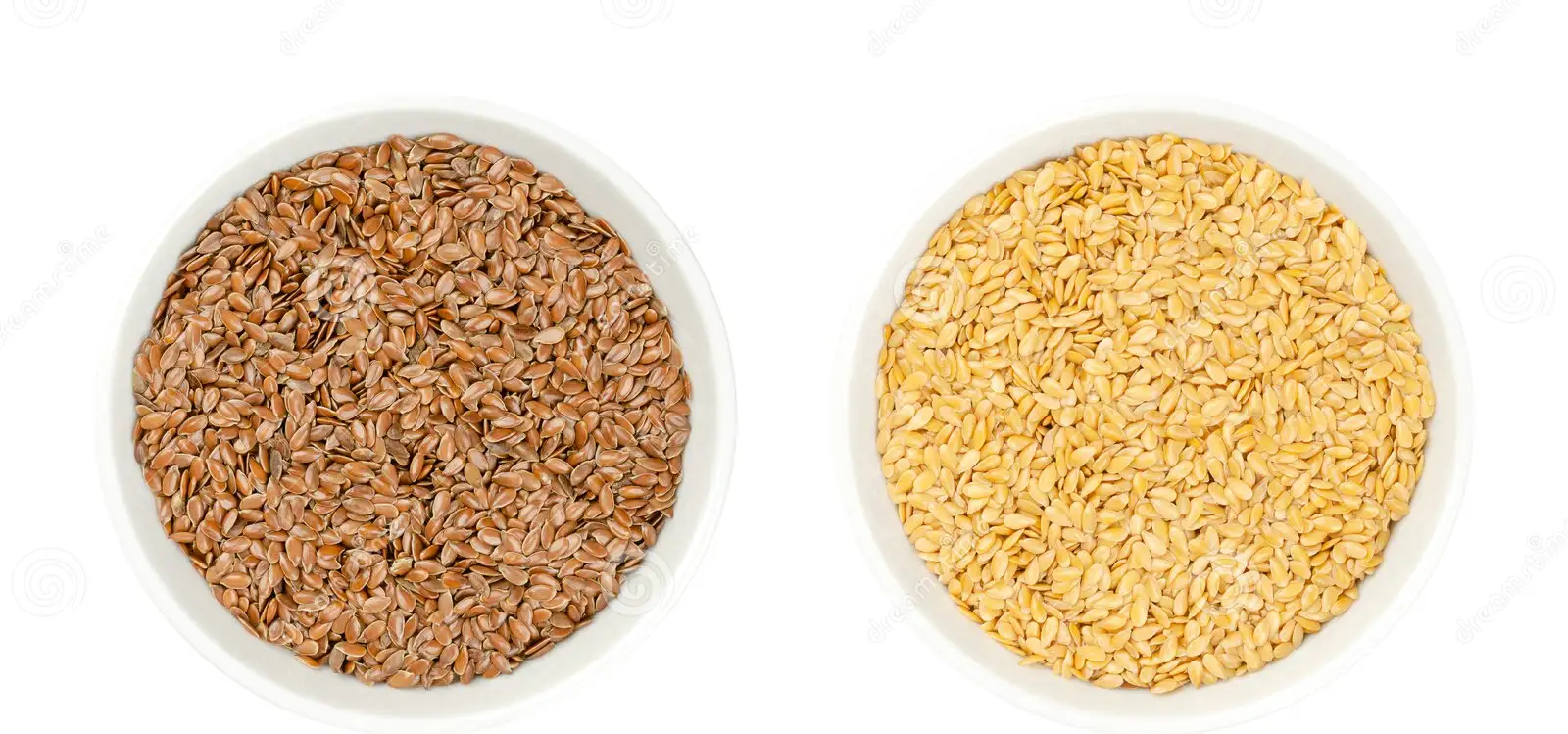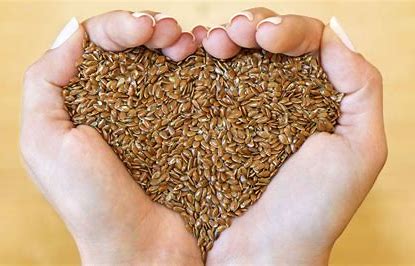Flax seed (Linum usitatissimum L.) is native to the eastern Mediterranean to India. Largest producer of flax seeds is Kazakhstan, Cananda, Russia, and China. Flaxseed mainly grows in cool climate and under long period of daylight. There are mainly two varieties of flaxseeds depends on colour such as brown and golden flax seed. Both types of flax seed contains same nutrient content. 
Both are very high in omega 3 fatty acid ( alpha – linolenic acid). Oil is also produces from flax seed which is known as linseed oil.
Nutritive value (per 100 gm) of flaxseed is calorie 533 kcal, carbohydrate 29gm ,fat 42gm, protein 18gm, vit c 0.6mg iron 5.7mg, pyridoxine 0.5mg, magnesium 392 mg , calcium 255mg, sodium 30mg, potassium 813mg. flaxseed contains 20-40% soluble fibre and 60-80% insoluble fibre. Two table spoon flaxseed which is around 20 gm provides 6gms of fibre, it is around 15-25% of RDA for both men and women.
Different compound present in flax seeds and their health benefits
Omega-3 and Omega 6 fatty acid
Flaxseeds contains around 73% PUFA such as omega -3 (ALA) and omega 6 fatty acids. It’s a richest plant source of omega 3 fatty acid ALA. ALA is an essential fatty acid. Both fatty acids helps to prevent or lowers the risk of various chronic diseases. Several studies shows that omega -3 helps in reduce inflammation in the arteries. It also improve blood platelet function. Omega -3 present in flaxseeds also improve brain function during any neural diseases. During pregnancy dietary intake of flaxseed helps in cognitive development of foetus.
Glutamine and arginine
Flaxseeds are high in amino acid arginine and glutamine. Glutamine helps to regulate gut barrier function, immune-inflammatory response, helps in digestion and proper brain function. Arginine helps in collagen formation, improves blood flow in the arteries of the blood, lowers blood pressure.
Mucilage
Flaxseed contains mucilage as soluble fibre. Soluble fibre helps to regulate blood sugar level and blood cholesterol level. As flax seeds contains both soluble and insoluble fibre , it works as a natural laxatives in our body and can prevent constipation .
Vitamins and minerals
Flaxseeds contains a number of vitamins and minerals like thiamine, copper, molybdenum, phosphorus, magnesium. Thiamine/ vit B1 helps in normal metabolism and good nerve function. Phosphorus helps to maintain bone health and tissue health.
Plant compounds
Flaxseed contains many plant compounds like p-coumaric acid which is an antioxidant, Ferulic acid its also an antioxidant and helps to prevents various chronic diseases. Phytosterol also presents in flaxseeds and many research shows that phytosterol lowers blood cholesterol, reduce inflammation, improves immunity, prevents cancer. Flaxseed contains up to 800 times more lignans than other plants. Lignans acting as both phytoestrogens and antioxidants. Phytoestrogens are oestrogen like compound found in plant sources. Its has similar structure as 17β-estradiol and it binds with alpha and beta receptor of oestrogen. There are mainly four types of phytoestrogens isoflavones, stilbene, coumestan, and lignan. Endogenous oestrogen which are produced by the ovaries become low after menopause. During menopause lignans act as weak oestrogens. Several studies shows that phytoestrogen have protective effect on cardiovascular health. It helps to reduce total cholesterol and improve heart function. Lignans present in flaxseed also helps to reduce blood pressure, oxidative stress.
Some other health benefits of flax seed

Weight loss
As flax seeds contains both insoluble and soluble fibre it helps in weight loss. Soluble fibre present in flax seed when mixed with water becomes very sticky and studies have shown that that fibre suppress hunger and cravings and promotes weight loss. Phytoestrogen pesent in flax seeds also helps in weight loss by increase fat free mass and inhibit the life cycle of adipose tissue.
Digestive health
Many studies found that flax seed prevents both constipation and diarrhoea because it contains both soluble and insoluble fibres. Insoluble fibre add bulks to stool and relieves constipation. On the other hand soluble fibre binds with water and it causes to swell and increase the bulk of stool of stool and thus prevents diarrhoea.
Diabetes
Flax seed is a functional food which is low in carbohydrate. A study was done in 2011which showed that supplementation of 10-12 gm of flax seed powder a day for 1-2 months may reduce fasting blood sugar level among those people who have type 2 diabetes mellitus.
Blood pressure
Studies have shown that flaxseeds helps to reduce both systolic and diastolic blood pressure in patient with peripheral arterial disease. Brachial and central blood pressure is also reduced by dietary flaxseed. Lignan present in flax seeds also helps to reduce blood pressure.
Cancer
A study conducted in 2003, which shows that elevated level of serum oestrogen and androgen among post-menopausal women has an increased risk of breast cancer. Researches shows that lignans present in flax seeds alters hormone metabolism and subsequent cancer risk. In our gut lignans are fermented by bacteria and may reduce the growth of several cancers especially hormones-sensitive types like breast, uterus, and prostate cancer.
Skin health
Lignans present in flaxseed have anti-inflammatory effect which helps to reduce various inflammation caused by different skin problems like acne, eczema, and psoriasis. Linoleic acid present in flax seeds helps to maintain skin`s barrier function and thus helps to maintain skin hydration.
Toxicity
There are some compound presents in flaxseeds such as cyanogenic glycosides such as linamarin, linustatin etc. but no increase in plasma cyanogenic level above baseline is found with the consumption of 15-100gm of flaxseed. Cyanide compound destroys during cooking that’s why slightly roasting of flaxseeds is recommend before consumption.
Process of consumption
Flaxseed can be eaten in soaked form. But it’s better to roast it slightly before consumption. 5-10gm of flaxseed should be eaten daily.
Restriction
Flaxseed is restricted for those people who has bowel obstruction, inflammatory bowel disease, narrow esophagus , high triglycerides level and After surgery.
Ways to consume flaxseed
- In powder form by mixing in water or smoothy
- As salad dressing
- By mix into yogurt
- By mix into milk
- By adding in ladoos etc.
References
https://www.mdpi.com/2072-6643/11/5/1171
Ms. Srayashee Bandyopadhyay
M.sc Clinical nutrition and dietetics (SNDTWU)
Nutritionist content writer from Nutriworld team.



